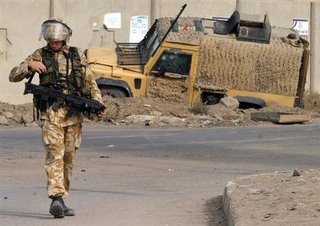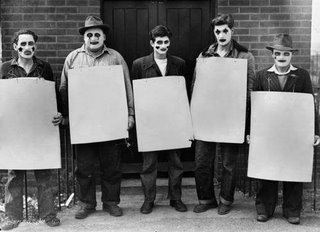"A bayonet is a weapon with a working man at either end. Betray your country, serve your class and don't go off to war my friend." The words of the fine Scottish socialist John Maclean during the first world war (and now turned into a song) and I think it's fair to say these are sentiments that define left wing anti-imperialism. The anti-war movement is of course far broader than that. When two million marched in London on Feb 15th all those years ago there were probably as many reasons to oppose the war as there were demonstrators.
The anti-war movement is of course far broader than that. When two million marched in London on Feb 15th all those years ago there were probably as many reasons to oppose the war as there were demonstrators.
Some believed the government was lying about the threat, some thought a war for oil was not worth fighting, some saw this as a war against predominantly Muslim countries, some thought British soldiers should not risk their lives for other people's problems and others thought that violence and war is wrong out of principle.
The fact that the anti-war movement embraced these strands, and a host of others I've not mentioned, was certainly a source of strength rather than weakness. An ideologically pure movement against the war would have been as insignificant as it was reactionary.
So how do we marry together the character and analysis of a left anti-imperialism and all these strands of thought that will share some parts of the critique and wildly diverge elsewhere. The two dangers are clear - either we end up excluding those who are genuinely opposed to the war on the basis of a real political disagreement, effectively becoming gatekeepers to the movement, or we submerge our ideas within a safer, more respectable milieu, which would be less challenging but also dishonest and risks turning a movement into a dull and bland slogan shop.
I'm thinking about this because of military families against the war a campaign supported by the Stop the War Coalition which is going to be standing single issue anti-war candidates against New Labour Ministers at the next election (which is some way off thankfully).
Their website understandably reflects where they are coming from and includes phrases like "The soldiers in Iraq and their families at home have the most at stake in this conflict" "Their patriotism is being abused" and they announce proudly that they will be at front of the StWC march.
Now whilst I'm glad these families are standing up and making life difficult for the government I'm also mulling over some of the complications that are as yet undiscussed.
Firstly, should we be treating the war as a single issue campaign? Are we generalising anti-war feeling into something broader or are we narrowing anti-imperialism into a 'safer' and more limitted stream? My particular concern here is that the left ends up holding people back from drawing anti-capitalist conclusions, or at least tells them that "there is a time and a place" and that we should only concentrate on those issues where the majority of the population agrees with us.
Secondly, the logic of a campaign that focuses on military families draws the eye away from the consequences of the military actions and focuses on the welfare of UK soldiers. I'm unhappy with that. One of the reasons I'm unhappy with the anti-Vietnam war films like Platoon and Full Metal Jacket - great films that they are - they essentially say "It was not nice to be a US soldier in Vietnam" and a rounder or more internationalist approach cannot confine itself to this, although I'm happy for it to be a part of the argument.
We have a series of imperialist wars, fought by predominantly working class armies that have created a nightmare in the regions they are visitted upon. These imperialist armies are the sharp end of the problem.
I think it's important to recognise that when a group forms that specifically endorses the army some of us on the left are not going to say "oh great". I kinda of feel they are asking me to forget all the principles and beliefs that led to oppose the war in the first place. I don't think I can do that.
I don't support the army. I sympathise with the position many service men find themselves in but at the same time I want the US and UK goverments to be driven out of their imperialist ventures and therefore if my hopes are to be realised many of "our boys" may have to die. I don't celebrate it - but I also find it difficult to feel bad when I hear UK soldiers are having a hard time in Afghanistan. They should be having a hard time. This is a good thing.
I sympathise with the position many service men find themselves in but at the same time I want the US and UK goverments to be driven out of their imperialist ventures and therefore if my hopes are to be realised many of "our boys" may have to die. I don't celebrate it - but I also find it difficult to feel bad when I hear UK soldiers are having a hard time in Afghanistan. They should be having a hard time. This is a good thing.
There is a very interesting interview at Renegade Eye with Hamid Taqvaee on the Third Camp Manifesto where he says that "As far as I remember, since the start of my political life, I have heard this sort of position from anti-imperialist activists. They ask 'What is the main problem?' but never ask for whom and in what context. They imply that there is one main problem for every single person in our era. "
I think this is important for a nuanced critique. I do not support an idealised resistance and I certainly believe that many of those who act in its name (or one of its names I should say perhaps) are reactionary, counterproductive and should also be opposed. But the US and UK governments need to pay a heavy price for their mistakes so that the withdrawal of troops does not simply free them up for the next adventure but they leave with their tail between their legs cringing and twitching at the thought of invading new countries.
Thirdly, the nature of the anti-war movement has always been contested. Is it the StWC? Well some people think it is but I believe it to be a broad movement rather than a coalition of tendencies, branches and groupings. I think the movement's very diversity and breadth is a source of strength and what made the movement as influential as it is. I think it's disrespectful to turn these people into someone else's stage army - no matter how great their contribution has been.
But whilst some see the movement as linear they (accidentally?) invent centralised hierarchies for that movement. So there is a list of ten to twenty big names who are *the* anti-war speakers nationally, even though in reality there are hundreds of big names who oppose the war. The military families have become an *unassailable* element in the movement, they will head the march on the Labour Party conference next Saturday - I'm very uncomfortable with that. I think it prevents discussion and growth - and distorts the core issues of the wars.
 When Reg Keys or Rose Gentle stand they do so as the "real" anti-war movement as such. They are given moral weight by both the movement and importantly by the media, because it suits the media to say the main difficulty with these wars is how they effect us. I think this pushes us towards the idea that the main problem for the war is the that Brits suffer. I find this problematic.
When Reg Keys or Rose Gentle stand they do so as the "real" anti-war movement as such. They are given moral weight by both the movement and importantly by the media, because it suits the media to say the main difficulty with these wars is how they effect us. I think this pushes us towards the idea that the main problem for the war is the that Brits suffer. I find this problematic.
For me the anti-war movement needs to move away from;
a) sloganeering
b) hierarchies / centralisation
c) the submerging of the character and principle of those who oppose the war into a homogenous, safe and respectable campaign.
These Military Family campaigns ARE a valuable contribution to the anti-war movement but I'm concerned that by giving a priveleged place in the movement to any one section we are actually weakening the movement and giving the appearance that we have less to say than we actually do.

No comments:
Post a Comment